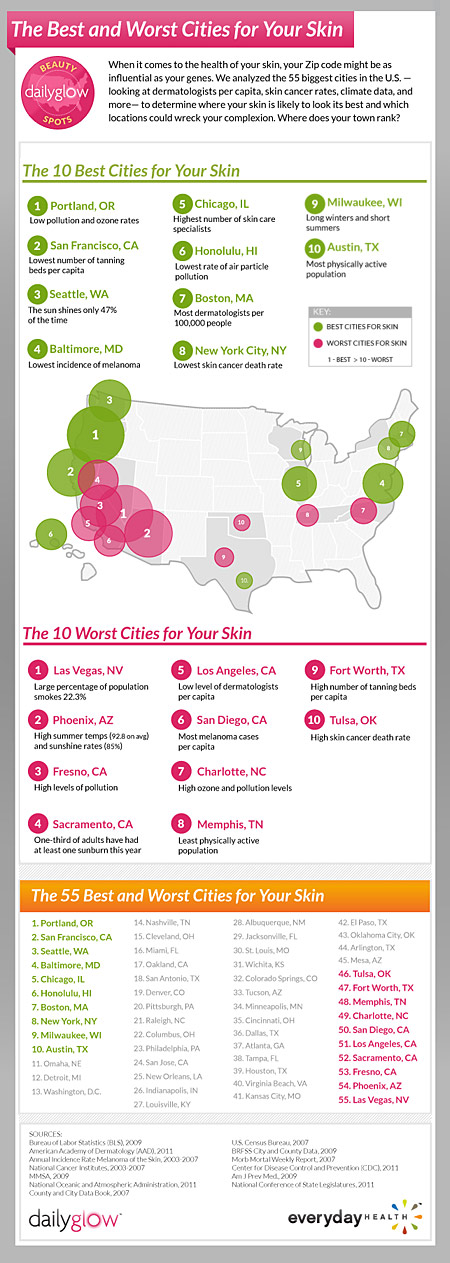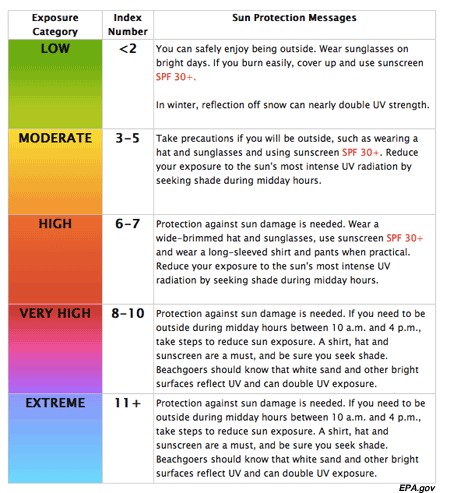Our skin is the largest organ in our body, and yet, it’s one that we tend to neglect more than any other. Some more so than others. Today, Daily Glow announced its 55 Best and Worst Cities for Your Skin, and you may be surprised to see who makes which end of the list.
Your ZIP code can play as much a role in the health of your skin as your genes and sun exposure this summer. This is good news for people in Portland, OR, San Francisco, CA, and Seattle, WA, the top three best cities for your skin. Daily Glow points out that skin health is determined by a variety of factors including the environment, genetics, and lifestyle. In those locations there is low pollution, low ozone rates, and minimal sun shine. In San Francisco, they have the least tanning beds per capita.
“One of the most surprising things we found was that cities in areas that are sunny actually have conditions that are good for your skin,” Dr. Jessica Wu told us. Dr. Wu is a dermatologist to the stars and works as Daily Glow’s Skin and Beauty advisor. She pointed out that Honolulu, Hawaii, which is number six on the list, is a great place for skin because of the low incidence of pollution and high levels of humidity.
There are 10 cities on the list deemed the Worst Cities for Your Skin, and it’s there where the environment and lifestyle are taking a toll on the residents’ skin. Las Vegas, Nev. was named the worst city, as it has the highest number of smokers in the entire country. Forth Worth, TX landed on the list for having the highest number of tanning beds per capita. And Tulsa, OK is the 10th worst because it has the highest number of skin cancer-related deaths.

Dr. Wu’s findings show that we could actually be doing a lot to improve the health of our skin. For starters, stop going to the tanning bed! Dr. Wu called the practice “shocking and disturbing,” and pointed out that any tanning salon that’s advertising their safety is clearly not safe.
 You might wonder why Austin, TX earning a top 10 spot for having the most active population, and Memphis earning the opposite recognition, would have anything to do with skin. Outside of wearing a hat and a high SPF sunblock, Dr. Wu suggests that exercise is key for healthy skin.
You might wonder why Austin, TX earning a top 10 spot for having the most active population, and Memphis earning the opposite recognition, would have anything to do with skin. Outside of wearing a hat and a high SPF sunblock, Dr. Wu suggests that exercise is key for healthy skin.
“You might not think that exercise is connected to skin health, but several animal studies found that exercise can protect against skin cancer,” she told us. She drew the line that regular cardio exercise can reduce obesity, and fat in the body produces inflammation that contributes to skin diseases like cancer. So lose weight, reduce inflammation, and reduce incidence of skin cancer.
Additionally, Dr. Wu said that we all need to look to our diet to protect our skin. She called out foods that have sun-protective qualities include tomatoes, red wine, and green tea because of their high antioxidant value. She said these certainly aren’t replacements for sun block or other protection, but that they can help your skin protect itself from UV rays and pollutants.
Her advice, and this list, are nothing to brush off. Skin cancer is still prevalent, although the mortality rate has come down in recent decades. However, she mentioned a study from the Mayo clinic (published spring 2026) that says melanoma continues to rise in young women eight fold! While there’s no definitive research that links these melanoma rates to tanning beds, Dr. Wu said that Mayo suggests a correlation does exist.
We were struck by how the best cities for skin occur in the northern half of the country, while the worst cities for skin occur in the southern half (the states for best and worst health layout the same, too). Dr. Wu says this is due in part to the northern residents having greater access to health care and more availability of dermatology specialists which contribute to early detection and greater education. No matter where you live, Dr. Wu recommended using the UV Index map at EPA.gov to know the UV forecast for your city and use that to take extra precautions when outdoors.
Remember to protect your skin from both cancer and early aging, exercise often, eat antioxidant-rich foods, avoid tanning beds, cover your skin with sunblock and hats, and visit your doctor for a screening if you suspect a risk for cancer.
“Hopefully people in the worst cities will be motivated to take better care,” said Dr. Wu.
Also Read:
New Rules for Sunscreen by Late 2026
